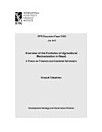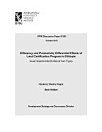Reverse-Share-Tenancy and Marshallian Inefficiency: Landowners Bargaining Power and Sharecroppers Productivity
Hosaena Ghebru Hagos · Stein T. Holden
květen 2013 · IFPRI Discussion Paper Kniha 1 · Intl Food Policy Res Inst
E‑kniha
48
Stránky
family_home
Vhodná
info
reportHodnocení a recenze nejsou ověřeny Další informace
Podrobnosti o e‑knize
While there are ample empirical studies that claim the potential disincentive effects of sharecropping arrangements, the existing literature is shallow in explaining why share tenancy contracts are prevalent and diffusing in many developing countries. Using a unique tenant-landlord matched dataset from the Tigray region of Ethiopia, we are able to show how the tenants strategic response to the varying economic and tenure-security status of the landlords can explain sharecroppers productivity differentials. To the best of our knowledge, this is the first study to use tenantlandlord matched data that accounts for both the supply (landlord) and demand (tenant) side characteristics in analyzing sharecroppers level of effort and productivity. The study reveals that sharecroppers yields are significantly lower on plots leased from landlords who are non-kin, who are female, who have lower income-generating opportunity, and who are tenure insecure than on plots leased from landlords with the opposite characteristics. While, on aggregate, the results show no significant efficiency loss on kin-operated sharecropped plots, more decomposed analyses indicate strong evidence of Marshallian inefficiency on kin-operated plots leased from landlords with weaker bargaining power and higher tenure insecurity. This study thus shows how failure to control for the heterogeneity of landowners characteristics can explain the lack of clarity in the existing empirical literature on the extent of moral hazard problems in sharecropping contracts.
Ohodnotit e‑knihu
Sdělte nám, co si myslíte.
Informace o čtení
Telefony a tablety
Nainstalujte si aplikaci Knihy Google Play pro Android a iPad/iPhone. Aplikace se automaticky synchronizuje s vaším účtem a umožní vám číst v režimu online nebo offline, ať jste kdekoliv.
Notebooky a počítače
Audioknihy zakoupené na Google Play můžete poslouchat pomocí webového prohlížeče v počítači.
Čtečky a další zařízení
Pokud chcete číst knihy ve čtečkách elektronických knih, jako např. Kobo, je třeba soubor stáhnout a přenést do zařízení. Při přenášení souborů do podporovaných čteček elektronických knih postupujte podle podrobných pokynů v centru nápovědy.








